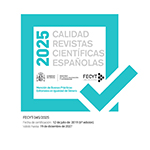Linajes urbanos y Parientes Mayores en Guipúzcoa a finales de la Edad Media (1450-1520)
Resumen
Durante el tránsito de la Edad Media a la Edad Moderna los linajes urbanos y los Parientes Mayores siguieron compartiendo intereses comunes y estrechos lazos sanguíneos y económicos, que les permitieron monopolizar el poder de las villas guipuzcoanas y copar la mayor parte de los cargos concejiles, dando lugar a un proceso de oligarquización. El trabajo de investigación se vale de métodos prosopográficos para analizar una serie de fuentes inéditas o escasamente utilizadas hasta la fecha, complementadas por otras suficientemente conocidas, para demostrar que, a pesar de lo que ha venido manteniendo la historiografía, los Parientes Mayores no fueron vencidos y desplazados por los linajes urbanos, si no que se produjo una simbiosis entre ambos, lo que les permitió seguir controlando la vida política local y provincial de forma directa o indirecta.
Descargas
Descarga artículo
Licencia
La revista En la España Medieval, para fomentar el intercambio global del conocimiento, facilita el acceso sin restricciones a sus contenidos desde el momento de su publicación en la presente edición electrónica, y por eso es una revista de acceso abierto. Los originales publicados en esta revista son propiedad de la Universidad Complutense de Madrid y es obligatorio citar su procedencia en cualquier reproducción total o parcial. Todos los contenidos se distribuyen bajo una licencia de uso y distribución Creative Commons Reconocimiento 4.0 (CC BY 4.0). Esta circunstancia ha de hacerse constar expresamente de esta forma cuando sea necesario. Puede consultar la versión informativa y el texto legal de la licencia.
La revista En la España Medieval no cobra por tasas por envío de trabajos, ni tampoco cuotas por la publicación de sus artículos.












